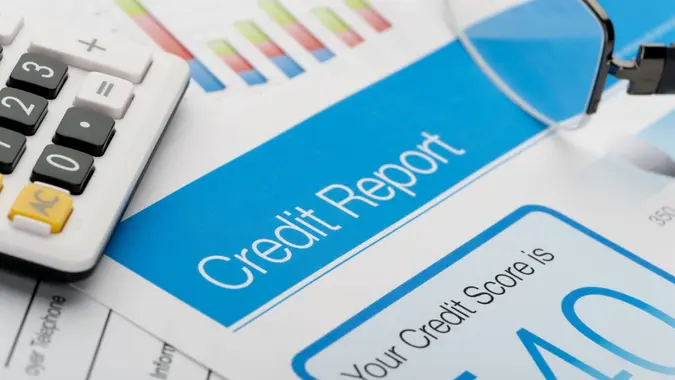Will an Overdraft on Your Bank Account Affect Your Credit Score?

Commitment to Our Readers
GOBankingRates' editorial team is committed to bringing you unbiased reviews and information. We use data-driven methodologies to evaluate financial products and services - our reviews and ratings are not influenced by advertisers. You can read more about our editorial guidelines and our products and services review methodology.

20 Years
Helping You Live Richer

Reviewed
by Experts

Trusted by
Millions of Readers
When you think about managing your money and your bank account, the last thing you want to have to deal with is an overdraft. It’s a scenario many encounter: spending more than what’s in the bank . But how does this common issue impact your credit score? Here’s more about how overdrafts and credit scores work, so you can manage your finances more effectively.
Read: 3 Ways To Recession-Proof Your Retirement
What Is an Overdraft?
Imagine you’re at the grocery store, you’ve filled your cart, and you swipe your card at checkout, only to realize later that you’ve spent more than what you have. That’s an overdraft. Your bank might cover this extra amount, but usually, they’re not doing it out of the kindness of their hearts – there are fees involved.
What Do Overdrafts Do to Your Credit Score?
Here’s the deal: overdrafts aren’t like your typical debts that get reported to credit bureaus. So, an overdraft in itself isn’t going to nudge your credit score up or down. Credit bureaus are more interested in how you handle loans and credit card bills.
What Are Extended Overdrafts?
It’s not all clear skies, though. If you let your account sit too long without fixing it, your bank might lose patience, close your account and hand over the debt to a collection agency. Once it reaches that stage, it’s like a red flag on your credit report, and yes, it can ding your credit score.
Does Your Checking Account Show Up on Your Credit Report?
When it comes to your credit report, the focus is predominantly on credit-related activities – think loans, credit cards and lines of credit. Your checking account, by itself, doesn’t fall into this category. Therefore, the day-to-day transactions on your checking account, including deposits, withdrawals and even your account balance, aren’t reflected in your credit report.
However, certain activities related to your checking account can make their way onto your credit report, but only in specific circumstances. For instance, if you have an overdraft line of credit attached to your checking account and it goes unpaid, this could be reported to the credit bureaus. Similarly, if your account becomes severely overdrawn and the debt is handed over to a collection agency, this will likely appear on your credit report.
It’s also worth noting that some banks and financial institutions conduct credit checks when you open a new checking account. This check can show up as a hard inquiry on your credit report, but it’s usually a minor factor and doesn’t significantly impact your credit score.
What Might Show on Your Credit Report?
- Unpaid overdraft line of credit linked to your account.
- Account severely overdrawn for an extended period.
- Overdrawn account debt transferred to a collection agency.
What Is Overdraft Protection? A Safety Net with a Catch
Many banks offer overdraft protection, where they link your checking account to maybe a savings account or a line of credit to cover any over-the-top spending. This sounds great on paper, but if you’re not careful, it can backfire. Suppose the overdraft dips into a linked credit line, and you don’t pay it back promptly – that’s when your credit score might feel the pinch.
Tips for Avoiding Overdrafts
To keep overdrafts from messing with your finances, consider these strategies:
- Keep tabs on your balance. Regularly check your account. Most banks have apps that make this super easy.
- Set up alerts. You can usually set alerts for when your balance goes below a certain point.
- Maintain a buffer. Try to have a little extra in your account as a safety buffer.
- Understand your overdraft protection. Know the ins and outs of how your bank’s overdraft protection works.
- Budget wisely. Good old budgeting – it’s a lifesaver. It keeps your spending in check and helps avoid overdrafts.
Final Take
An overdraft doesn’t directly hit your credit score, but if not managed properly, it can lead to situations that do. It’s like a chain reaction – one thing leads to another. Keep a vigilant eye on your finances and plan wisely so you can steer clear of these issues, ensuring your credit score remains unscathed by the occasional financial hiccup.
FAQ
Here are answers to some of frequently asked questions about overdrafts and credit scores.- How bad is it to overdraft your bank account?
- Overdrafting your bank account isn't ideal as it can lead to fees and, if not addressed promptly, may cause bigger financial issues. While it doesn't directly affect your credit score, repeated overdrafts can indirectly lead to credit problems if the account goes to collections. It's best to manage your account carefully to avoid overdrafts.
- Does overdraft increase affect credit score?
- An overdraft itself typically doesn't affect your credit score directly. However, if not resolved, it can lead to situations, like debt collection, that negatively impact your score. It's important to promptly address overdrafts to avoid these indirect effects on your credit health.
- What to do if you overdraft and have no money?
- If you overdraft and have no money, contact your bank immediately to discuss options. They may offer a payment plan or waive certain fees. In the meantime, try to minimize spending more and find ways to add funds to your account, even if it's a small amount, to help reduce the overdraft. Open communication with your bank is key.
Editor's note: This article was produced via automated technology and then fine-tuned and verified for accuracy by a member of GOBankingRates' editorial team.
 Written by
Written by 























